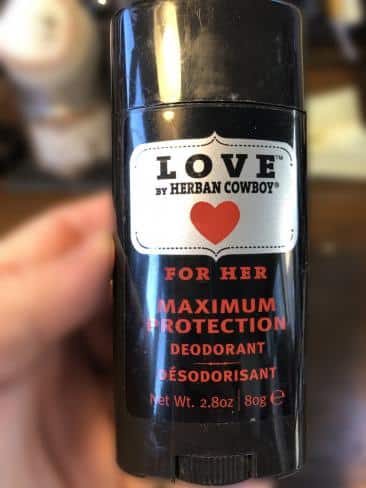Do I Smell? Putting Natural Deodorants to the Test. When something smells bad, we try to avoid it, which is kind of terrible if it’s us.
written by:
reviewed by:

Table of contents
The scariest question you can ask yourself is not “Why do I exist?” or “What am I supposed to do with my life?” It’s “Do I smell?”
You do, by the way. You smell terrible. You smell like a ham and cheese and garlic sandwich left in the sun on hot tar for a month. You smell like a giant wheel of parmesan cheese smoking a cigar. You smell like an old sweaty horse trader in 1934. In June.
Well, that’s probably what you think you smell like. That’s kind of what we all think we smell like, thanks to James Young, the copywriter for Odorono, the first commercial deodorant, who wrote in Ladies Home Journal, 1919:
“It is the chemicals of the body, not uncleanliness, that cause odor. And even though there is no active perspiration—no apparent moisture—there may be under the arms an odor unnoticed by themselves, but distinctly noticeable to others.”
James Young was not entirely wrong. Underarm odor is caused by the apocrine glands, and despite Young’s assertion that uncleanliness doesn’t contribute, it does. A little soap and water go a long way in washing off the oils and bacterial effluvium that’s building up, leaving you smelling fresh as a daisy.
For a little while.
Body Odor Is Complicated
Even the cleanest, most fastidious bather may find themselves standing in the office, knowing full well they applied deodorant that morning, secretly panicking, asking themselves: why do I smell?
Assuming you’ve performed your daily ablutions and applied a film of deodorant … well, it’s hard to say. Bodies are weird. But what’s wafting out of your body may be the result of what goes into your body.
You Sweat What You Eat
Booze
Your body breaks alcohol down into intermediary compounds, the bulk of which are two chemicals, Acetaldehyde, which transforms further into Acetate. Those compounds are secreted onto your skin in your sweat which is then metabolized by bacteria, giving you that next day, I-went-on-a-bender, bouquet.
Red meat
Red meat is full of fat and Sulphur compounds. A report from Evolution and Human Behavior suggested perspiration from men on a plant-based diet was considered by women to be more appealing than sweat from their carnivorous bros.
Netflix
In 2002, Neuroendocrinology Letters, published findings from the Ludwig-Boltzmann-Institute for Urban Ethology. Three of their scientists made 42 women between 18 and 33 watch the 1992 horror flick, “Candyman,” while collecting samples of their perspiration. When asked to rate the odor of samples from before and after watching Virginia Madsen almost die in an inferno started by a psychopathic murderous urban legend, the women found the post Candyman samples less appealing, saying they smelled like rage, aggression, and fear. Candyman maintains a rating of 74% on Rotten Tomatoes.
Your antiperspirant
If you’re more worried about sweat than smell I have some bad news. Using antiperspirants can make your armpit bacteria go crazy, resulting in an increased odor. This may be the result of the salts and aluminum in antiperspirants throwing off your armpit biome, allowing the smellier bacteria to thrive and Karen from accounting to avoid you in the breakroom.
What Can I Do So I Don’t Smell?
Shower more? That’s great for remote workers and professional shower testers, but for those of us who work in an office, a second shower is not an option. That’s why we use deodorant. Maybe if we switched from chemical-based applications to natural ones we might smell less?
Deodorants are a personal choice. If you ask science for a little help, it just rolls its eyes and goes back to reading abstracts because science doesn’t care. There is not a lot of research indicating natural deodorants are healthier for you than those made from nuclear waste. But these facts are indisputable: The ingredients of all-natural deodorants are all natural, so if you are a person who believes your environmental footprint should be as dainty as your B.O., then load up.
Three Natural Deoderants to Try
Here are three natural deodorants that use essential oils and natural extracts. And because I’m serious about this, I used them while at Fish Camp in Michigan, then on a trip to Alabama in June when it was 900 degrees. You’re welcome.

Schmits Cedarwood and Juniper Deodorant
Price: $8 to $9.
Format: Stick deodorant
Fragrance: I smelled like a cedarwood box. I smelled like I was drinking really expensive gin in a forest.
Ingredients: Butyrospermum parkii (shea butter), sodium bicarbonate (baking soda), maranta arundinacea (arrowroot) powder, theobroma cacao (cocoa) seed butter, cedrus deodara (himalayan cedar) essential oil, tocopherol (vitamin E), juniperus (juniper) essential oil, humulus lupulus (hop) extract.
Method: I applied Schmits on the first day of Fish Camp, walked outside and realized I was in Michigan and it was 30 degrees and I was on a lake. Sweating was not so much an issue. However, neither were the fish so we retired to the cabin where my friend’s one-million-year-old father kept the thermostat pegged at a balmy 81 degrees, with a fire. I sweat through my t-shirt. I sweat through my hoodie. I sweat through the walls, into the forest and poisoned Lake Hamlin.
Results: These tests were super scientific, so I did not disclose to my test subjects that I was trying out natural deodorants. I was waiting for someone to notice. However, even after changing multiple shirts (seriously, it was hot) no one complained. They were pretty upset about the fishing, but I smelled like a warm spring arboreal dawn.

Herban Cowboy’s “Love for Her”
Price: $8 to $9.
Format: Stick deodorant.
Fragrance: I smelled like I was driving a 1974 Trans Am through a cypress grove.
Ingredients: Propanediol, Water, Aloe Barbadensis Leaf Juice, sodium stearate, Polysorbate 20, ethylhexylglycerin, rosmarinus officinalis (rosemary) Leaf extract, Carum Petroselinum (Parsley) extract, salvia officinalis (sage) Leaf extract, Allantoin, Zinc, fragrance, Bisabolol.
Method: Right before a 13-hour drive from Chicago to Birmingham, I applied Herban Cowboy’s Love for Her. It was humid and warm when I left the Windy City, but as I propelled myself southward, it got warmer and humider until every time I walked back to my car at a rest stop, I was damp and slightly woozy. To test the deodorants efficacy, I wandered among the incoming hordes of travelers to see if I offended anyone.
Results: I did not.

Duggan Sisters “Life Stinks Everywhere”
Price: $18.
Format: Powder
Fragrance: It didn’t smell at all.
Ingredients: aluminum-free sodium bicarbonate, tea tree oil, and either lavender or cedarwood oil.
Method: On my first day in rural Alabama, I washed and dried then, using my fingertips, applied the Duggan’s sister’s powder. I assumed I was going to make a huge mess and get powder everywhere and sneeze a lot. I did not. It was a cinch to apply and stayed where I put it. Sure, it’s a little gross as I am a large man who does not [editor has redacted this entirely superfluous information about Mr. Garlington’s armpits] and so, yeah, it was weird.
Results: I did not smell. Not at all. I didn’t smell like tea tree oil or lavender. I just didn’t smell. And the bottle lasts four months. My stick deodorant lasts about three weeks and that’s only because I work at home and the dog doesn’t care how I smell. This stuff will last me the rest of my life.
Your Mileage May Vary
Body odor stinks. The multi-billion-dollar industry serving that problem (and constantly telling us we smell) proves that point. But if you follow the advice above and perhaps use a really good natural deodorant, you’ll smell like a daisy. Or a forest. Or nothing at all.
Do you have a favorite? Tell us all about it in the comments below.
The information provided on Health Food Radar is intended for general informational purposes only. While we strive to offer accurate and up-to-date content, we do not provide medical advice, diagnosis, or treatment. Always consult with a qualified healthcare professional before making any dietary or lifestyle changes, especially if you have underlying health conditions or concerns.



